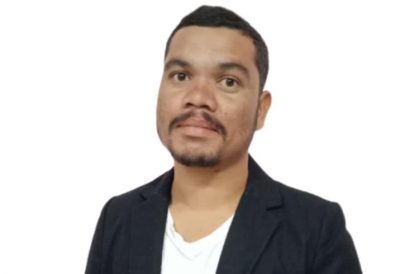
Ativista linguístico do gondi, Veer Keram. Foto disponibilizada por Veer Keram.
Depois da bem-sucedida campanha na internet no ano passado [1], a qual celebrou a diversidade linguística on-line da Ásia, o projeto colaborativo continua em 2020. Toda semana, um ativista linguístico diferente vai administrar a conta de Twitter @AsiaLangsOnline [2] para divulgar as experiências, boas práticas e lições aprendidas sobre o trabalho de revitalização e promoção do uso de suas línguas nativas, com foco no papel da internet. Essa campanha é uma colaboração entre a Rising Voices [3], a Digital Empowerment Foundation [4], e a O Foundation [5].
Toda semana, o anfitrião escolhido responderá algumas perguntas sobre seu perfil e sua língua. Essa entrevista com Veer Keram (@veerkeram750 [6]), oferece uma prévia sobre o que ele discutirá durante a semana que atuará como administrador.
Rising Voices (RV): Poderia contar um pouco sobre você?
Veer Keram (VK): My name is Veer Keram, and I belong to the Gond tribe [7]. I was born and brought up in Madhya Pradesh [8], in central India. I've graduated with a degree in law from Rani Durgavati University, in Jabalpur, Madhya Pradesh. With Gondi being my mother language, I have always had a keen interest in it. I've been in the field interacting with people who speak Gondi, trying to gather information about the language as well as the speakers. I am currently a part of the Endangered Language Documentation Project [9] which aims at promoting the use of Gondi language.
Veer Keram (VK): Meu nome é Veer Keram e eu pertenço à etnia gondi. Nasci e cresci em Madhya Pradesh [10], na região central da Índia. Sendo o gondi [11] a minha língua nativa, sempre tive um grande interesse por ela. Eu interajo com pessoas que falam o gondi, e procuro reunir informações sobre a língua e seus falantes. Atualmente, faço parte do Projeto de Documentação de Línguas Ameaçadas [9], que objetiva promover o uso do gondi.
RV: Qual é a situação atual do seu idioma na internet e fora dela?
VK: Gondi [12] is a South Central Dravidian language [13] spoken by about 2 million people belonging to the Gond tribe. Although it is the language of Gondi people, only one fifth of them actually use it, thereby making it vulnerable to extinction [14]. Former Madhya Pradesh Chief Minister Kamal Nath [15] had decided to include Gondi in the primary education curriculum [16] of the state's tribal dominated districts, but the plan has not been put into action until now. The rapid decline observed in the number of Gondi speakers is a matter of grave concern.
VK: O gondi é uma língua dravídica [17] falada por cerca de 2 milhões de pessoas da comunidade gondi. Mesmo sendo a língua do povo gondi, apenas um quinto dessas pessoas usam a língua, o que a torna vulnerável à extinção [14]. O antigo ministro chefe de Madhya Pradesh, Kamal Nath, decidiu incluir o gondi no currículo da educação primária [16] nos distritos em que a língua é falada, mas isso ainda não foi implementado. O rápido declínio do número de falantes do gondi é motivo de grande preocupação.
RV: Quais assuntos você pretende abordar durante a semana em que atuará como administrador da conta do Twitter @AsiaLangsOnline?
VK: During the week that I'll manage the @AsiaLangsOnline twitter account, I plan to focus primarily on the importance of language and why language conservation is the need of the hour in order to protect our identity as well as our culture and our traditional knowledge.
VK: Durante a semana em que eu administrarei a conta do Twitter @AsiaLangsOnline, pretendo falar principalmente sobre a importância das línguas e por que a conservação das línguas é necessária para proteger nossas identidades, culturas e conhecimentos tradicionais.
RV: Quais são as suas motivações principais para o ativismo digital sobre sua língua? Quais são suas esperanças e sonhos para a sua língua?
VK: Drawing inspiration from Dr Abhay Sagar Minz, assistant professor at Dr Shyama Prasad Mukherjee University, Ranchi, I wish to work towards protecting tribal languages and our rich cultural heritage with the same energy and vigor he displays.
Having said this, I have great hopes and dreams for my language in the future. Language is the vehicle that maintains our identity through generations. It is language that transmits the elements of our culture and traditional knowledge from one generation to the next. I wish for the Gondi language to become mandatory at the primary education level so that the coming generations remain attached to their roots from the very start. I also wish for it to gain recognition in the eighth schedule of our Constitution [18], which lists India's official languages. Members of the Gond community shall take immense pride in their language and culture.
VK: Buscando inspiração no Dr. Abhay Sagar Minz, professor assistente do Dr. Shyama Prasad Mukherjee, na Universidade Ranchi, eu desejo trabalhar pela proteção das línguas indígenas e de nossa riqueza cultural, com a mesma energia e vigor que ele apresenta.
Dito isso, tenho grandes esperanças e sonhos para minha língua. A língua é o veículo que conserva nossas identidades através das gerações. É a língua que transmite os elementos de nossa cultura e conhecimentos tradicionais de uma geração para a seguinte. Eu desejo que o gondi torne-se obrigatório na educação primária, para que as próximas gerações continuem vinculadas às suas raízes desde cedo. Eu também desejo que o gondi seja reconhecido pela constituição da Índia, como um língua oficial. Os membros da comunidade gondi deveriam ter muito orgulho de sua língua e cultura.